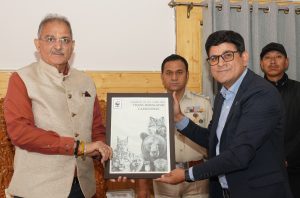GI tagging to safeguard Ladakh’s Heritage, boost global identity: LG Kavinder.

GI tagging to safeguard Ladakh’s Heritage, boost global identity: LG Kavinder.
Will shape Ladakh’s future by balancing tradition & modernity.
Leh, September 04: Granting Geographical Indications (GIs) to Ladakhi products will give them a unique global identity while safeguarding the region’s centuries-old traditions and indigenous knowledge. GI tagging will protect these products from imitation, enhance their market value, generate fair trade opportunities for artisans and farmers, and serve as a catalyst for tourism and economic growth, thereby ensuring that Ladakh’s cultural heritage is preserved and promoted worldwide.
This was stated by the Hon’ble Lieutenant Governor of Ladakh, Shri Kavinder Gupta, while interacting with Dr Rajni Kant, a GI Tagging expert and GI Facilitator, at the LG Secretariat.
The Lt Governor stated that the UT Ladakh Administration is committed to promoting more of Ladakh’s unique products on a global stage by ensuring that they receive GI tags from the government so that these products get their due recognition and fair price. He said there are several other products produced in Leh and Kargil which also deserve GI tags, and the UT Administration will work to secure them.
Dr. Rajni Kant informed the Lt Governor that the GI tag process for eight products from Leh district—Ladakh Pashmina Textile, Ladakh Nambu/Snambu Textile, Ladakh Pabu (shoes), Ladakh Thangka Painting, Ladakh Likir Pottery, Ladakh Chilling Metal Work, Ladakh Thigma (tie-and-dye textile), and Ladakh Challi Textiles—is in the final stages, and the focus would now be on securing GI tags for products made in Kargil.
The Lt Governor stated that the GI tags for these products would not only increase their marketability and value, along with boosting the local economy through fair prices and employment, but would also promote tourism and assure consumers of a product’s genuine quality.
Similarly, a delegation comprising members of Ladakh Buddhist Association (LBA) Leh, met the Lt Governor and requested the relocation of slaughterhouses to an appropriate place, which is far from human settlements.
Social activist Roqiya Bano from Chuchot Gongma met the LT Governor and apprised about various development issues in the area. A delegation from WWF-India met the Lt Governor and apprised about the ongoing projects in Leh for the protection of endangered wildlife species, special curriculum for students in schools, women empowerment and capacity-building of youth.
In his concluding remarks, the Lt Governor said that GI tagging, along with community participation and conservation initiatives, will play a pivotal role in shaping Ladakh’s future by striking a balance between tradition and modernity. He assured that the UT Administration will extend all necessary support to safeguard Ladakh’s heritage, protect its ecology, and empower its people, so that the Union Territory emerges as a global model of sustainable growth rooted in cultural pride.


